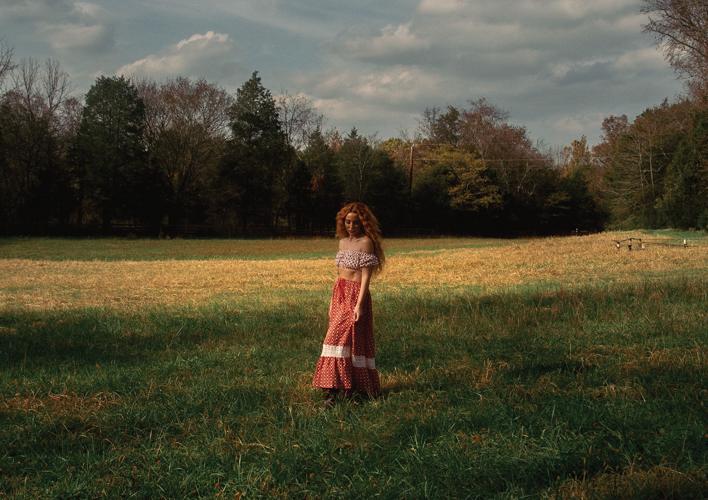
Ashley Monroe
When Ashley Monroe needs a reminder of what she’s been through, she reads a letter she wrote as a teenager on the two-year anniversary of her father’s death. It is a manifestation of sorts — a prayer that she’ll be able to live out her dream of being a singer.
“Since I can’t change the past, the future is a very hopeful place for me,” reads one passage. “I want to be able to share my love with others. … Please Lord, stay with me and give me the chance to do this.”
Monroe has been doing a lot of looking back lately. The country singer-songwriter (who is also one-third of supergroup Pistol Annies alongside Miranda Lambert and Angaleena Presley) was diagnosed in 2021 with lymphoplasmacytic lymphoma, a type of blood cancer. During the grueling months of treatment, the music stopped for Monroe.
“When I was going through chemo, I heard no melodies,” Monroe tells the Scene. “I didn’t sing. I just kind of closed the shades, which is weird for me because I’m always listening to music.”
In November 2022, Monroe’s test results showed she was cancer-free. The melodies came back, and with them came Monroe’s desire to look back on the people, places and experiences that shaped her. The Knoxville-born 38-year-old — who moved to Nashville at 15, signed a record deal at 17 and began breaking out at 26 with her Vince Gill-produced full-length Like a Rose and its perennial fan favorite “Weed Instead of Roses” — started writing again. She also pored over unreleased songs, many of which she’d penned years earlier. The result is Tennessee Lightning, a sweeping 17-track album Monroe describes as a “patchwork quilt of my life.”
“More than anything, Tennessee Lightning is me,” she says. “It’s like a flash of light, and for a second, everything else goes away.”
She began viewing her life in chapters, beginning with her upbringing. The soulful “Risen Road,” which Monroe penned with Brendan Benson and Waylon Payne, reflects on her use of pain pills following the death of her father. “You can read the Bible, quote it verse for verse,” Monroe sings. “You can steal a pain pill out of mama’s purse / And get a little high on Risen Road.”
“I like exposing truths that people don’t really talk about,” says Monroe. “I love the people [of East Tennessee] and I love the sense of humor and the Jesus-loving. But there’s also addiction and darkness too.”
The album,which Monroe co-produced with Grammy-winning producer and engineer Gena Johnson, features Monroe’s many collaborators turned friends. The aforementioned Vince Gill, who co-wrote Tennessee Lightning track “My Favorite Movie,” was one of Monroe’s earliest supporters.

Ashley Monroe
“[Gill] called me when I was still living in Brentwood with my mom and asked me if I wanted to go to breakfast,” Monroe remembers. “We hung up and then I had to call him back and say, ‘I don’t have a car, can you pick me up?’ So Vince Gill pulls into my mom’s little house in Brentwood and picks me up. It’s one of those things that changed everything.”
Monroe also teamed up with Marty Stuart to write the sultry “The Touch.” The song features Stuart on electric and acoustic guitar and Shelby Lynne on bass.
“In the recording, you can hear [Stuart’s] sleeve hit the guitar,” Monroe says. “I love being able to hear creaks here and there. I like to feel what’s happening in the room sometimes — especially if it’s Marty Stuart’s sleeve.”
Additional chapters on Tennessee Lightning look at young love, as in the Shangri-Las-esque “Hot Rod Pipe Dream” and the freewheeling Brittney Spencer collab “Bitter Swisher Sweet.” Monroe also explores womanhood and romance on “Amen Love” and “Moth,” grief on “Recover” (which features Little Big Town’s Karen Fairchild), and motherhood on “Moon Child.” There are also cover songs, including a haunting take on Leonard Cohen’s “Hey, That’s No Way to Say Goodbye.” It’s a fitting choice for an artist who’s been drawn to devastatingly sad songs since childhood.
“I would call it a lonely feeling,” Monroe says of her love for forlorn melodies. “I still seek out that feeling.”
One topic that’s not directly addressed is her cancer diagnosis and treatment. She says album closer and Armand Hutton collab “Jesus Hold My Hand,” a hymn she frequently sings to calm herself down, is the one song that takes her back to that time in her life.
“When something’s really hard and [I] go through it, I like to let it go,” she says. “I put it back in the ‘too hard’ box of my soul. I’ve always let music take me away from reality in a way.”
In the 2010s, Monroe achieved much of what she had envisioned in the letter she wrote as a teen. Though her life today looks somewhat different, she remains a determined force of nature. And she still has notebooks full of songs.
“I look back on how I saw my dreams coming true. I was a huge star, tour buses — all the typical things. Where I am now, my dreams have come true and better.”









